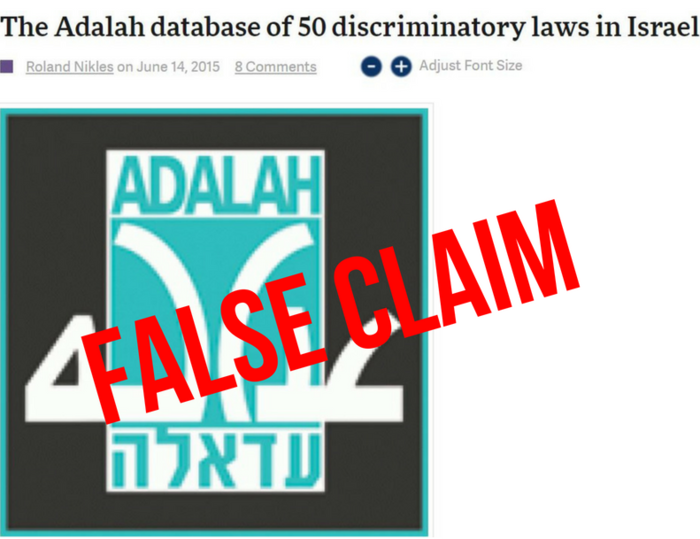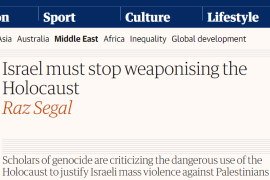The Guardian has, once again, disseminated the erroneous claim that Israel has “50 racist laws”, in an op-ed by Sami Abu Shehadeh, an Arab MK who was recently revealed to have attended an event marking the release of a terrorist convicted of conspiring to murder Israelis.
The op-ed (“Israel’s pact with the UAE is not about peace. It’s a business deal”, Oct. 14), included the following:
Discrimination and racism against Arab-Palestinian citizens of Israel, an indigenous population that makes up over 20% of the country’s population, is present in every aspect of life. More than 50 laws discriminate against non-Jewish citizens. Israel’s trains do not stop in a single Arab city.
There are actually two problems with that last sentence.
Turning to the second sentence we highlighted, that Israeli trains ‘don’t stop in Arab cities’: This is extremely misleading. There’s an Israel Railways station called Lehavim/Rahat, serving Rahat, the largest Arab Bedouin city in Israel. (The train station is a mere 18 minute drive from the town.)
Now, regarding 50 laws that allegedly discriminate against non-Jewish citizens, which, though unsourced, is almost certainly based on a report by the radical anti-Israel NGO Adalah.
However, CAMERA and other watchdog groups have refuted Adalah’s claims of racist laws – a term they use so unseriously that even an Israeli public health law requiring parents to vaccinate their children is included as an example of “racist” legislation.
A comprehensive analysis of the “50 racist laws” claim was conducted by the Institute for Zionist Strategies (IZS), and included the following highlights:
- The overwhelming majority of the laws featured in the list (53 out of 57) do not even relate to the citizens’ ethnic origins and those that do, are designed to prevent and avoid discrimination. For example, the Law and Administration Ordinance (1948) that defines the country’s official rest days, and the Law for Using the Hebrew Date, both explicitly exclude institutions and authorities that serve non-Jewish populations for whom the law provides for definitions and procedures appropriate for their specific needs.
- In 21 cases, Adalah’s claims of discrimination stem from the organization’s extremist stance that rejects the nature of Israel as a nation-state in general and as the nation-state of of the Jewish people in particular. For example, the Yad BenZvi Law is defined as a discriminatory law because of the institution’s objective of promoting Zionist ideals.
- 18 of the laws reflect customs in other Western democracies whose democratic character no one would disparage. For example, according to Adalah, the flag constitutes a discriminatory law. Needless to say, this unfounded reasoning would mean that any country, the flag of which bears a cross or crescent discriminates against its non-Christian or non-Muslim minorities. A more in-depth comparison between the laws frequently found that Israeli legislation is actually characterized by a higher degree of tolerance for its national minorities.
- In at least 13 cases, a large disparity exists between the explicit content of the laws and the biased (and sometimes warped) interpretation accorded to them by Adalah. In some instances the claimed discrimination is difficult to identify. For example, the Golan Heights Law is considered discriminatory due to its objective of “according a legal basis for the implementation of Israeli law on the territory of the Golan Heights conquered by Israel”. It would seem that only Adalah is capable of explaining a law intended to grant equal rights to all residents of the Golan Heights as being discriminatory.
- 8 laws are intended to protect the security of all Israeli citizens regardless of religion, race or gender. Included in these laws are a number of legislative amendments to the Criminal Procedure Law and the Prisons Ordinance aimed at assisting the security forces in preventing terror attacks. These laws adversely affect only those clearly suspected of engaging in terror activity without distinguishing between Jews and Arabs. In effect, this very claim is woefully discriminatory because it presumes that Arab citizens of Israel are generally hostile and prone to terror activities.
- 7 of the laws do not even relate to Israel’s Arab citizens but rather to those noncitizen individuals towards whom the State is not obligated to act with equality. 3 The absurdity in Adalah’s approach can be demonstrated by the example of the Trading with the Enemy Act (a law evolving from British Mandatory law) being included in the list of discriminatory laws because “the countries declared as such (Iran, Syria and Lebanon) are Arab and/or Muslim states”. Presumably the law could be remedied by adding other, non-Muslim and non-Arab enemy states.
- In the case of some of the laws mentioned in the list, the supposed discrimination in question actually affected the Jewish majority and not the Arab minority. For example, Clause 7a of the Basic Law: the Knesset, the objective of which is to prevent the candidacy of political parties acting against the existence of the State of Israel as a Jewish and democratic state, has been implemented only against Jewish parties on grounds of anti-democratic objectives. Similarly, amendments to the Absorption of Discharged Soldiers Law are indicted by Adalah for discriminating in favor of Jewish citizens, but these citizens are the ones specifically obligated to serve three years of military service for sub-minimum compensation and living conditions, thus postponing their university education and professional advancement. It is the Arab citizen who enjoys the option of exemption from military service altogether or alternatively, of volunteering for national civil service which does not place them in harms way but which nevertheless affords them the same benefits awarded to discharged soldiers.
- In a number of cases, Adalah misuses objective crime statistics to claim discrimination. According to this logic, if members of the Arab sector of the population are the main criminal violators of a certain law, then that particular law perforce is deemed racist. This could apply to laws against theft of property, against sex crimes or against driving through red lights. The constructive and proper solution, to disproportionate violations is not annulment of necessary laws, of course, but rather, educating and encouraging observance of the law among all sectors of the population-without distinction or favoritism.
A large portion of Adalah’s racism claims, they add, stems from their belief that Zionism is intrinsically racist, and that the Jewish state, within any borders, has no right to exist – a view considered antisemitic by the IHRA Working Definition.
The fact that such a patently false, unsourced claim smearing Israel got past Guardian editors is just another example of the media group’s institutional anti-Israel bigotry that we’ve been documenting on these pages over the last 11 years.
Editor’s Note: This post was revised on Oct. 22 to clarify the distance from the Lehavim/Rahat train station to the city of Rahat.





“Israel’s pact with the UAE is not about peace. It’s a business deal”, Oct. 14
So many Guardian hate-words in one headline: “Israel”, “business”, “pact” and “deal”.
Israel, the country the Guardian readers just love hating.
Doesn’t doing business generally ensure peaceful relations, or is that too complicated for the average Guardian reader?
Once again, Adam catches the Guardian attempting to confuse the issues about the State of Israel and a possible State of Palestine.
It is well worth doing because of the role Israel plays now in the the 21st Century ACE, and in history as calculated in the Jewish calender, apart from abstract considerations vis-a-vis ‘”justice is fairness,” and because he wins every argument every time. Where is our Abba Eban, I ask you, in all sincerity?
Maybe Greta Thunberg will develop into such a mensch?
I personally am no fawning fan of anyone, but I want to emphasize that I have never, ever, seen in person (including in a series of debates in high school in Iowa when I and my partner — she was a better debater, which is arguably why we ended up state champs, mind you!) or encountered in print, anyone who won every single argument, and won them as fairly as Adam Levick does versus the G.
So look at yourselves, Guardian staff and hierarchy, think about the points he raises, over and over, over a period of years.
You’re not collectively stupid, and I do not think you are intentionally hateful or bigoted. Therefore, since I argue in good faith for clarification about the G’s coverage of Israel, legit disputes, the works, I contribute these fragments of my thoughts and urge Adam to “keep on keepin’ on,” and the damn Guardian to be humble, and learn something from Adam, obviously a sincere critic.
P.S. I my half hour (after completing the seminar, each student was able to talk to Noam C. /”the Great Man” one on one, he’s a good guy of course) with Chomsky I asked him about the JFK assassination as far as media coverage. We agreed it was ludicrous.